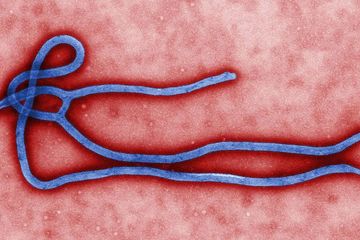submitted by George Hurlburt

Sierra Leonean doctors practice wearing protective clothing in the Ebola Training Academy in Freetown, Sierra Leone, December 16, 2014. Reuters
uk.reuters.com - by Kemo Cham and Emma Farge - October 21, 2015
. . . the case of Scottish nurse Pauline Cafferkey – the first known Ebola survivor to have an apparently life-threatening relapse – has revived concerns about the health of some 17,000 survivors in Sierra Leone, neighbouring Guinea and Liberia.
Doctors and health officials in Sierra Leone told Reuters that a handful of mystery deaths among discharged patients may also be types of Ebola relapses, stirring fear that the deadly virus may last far longer than previously thought in the body, causing other potentially lethal complications.
Diagnoses have not been made, partly because of a lack of relevant medical training and insufficient equipment for detecting a virus that can hide in inaccessible corners of the body - such as the spinal fluid or eyeball. In Cafferkey's case, the virus in her brain caused meningitis.
(READ COMPLETE ARTICLE)

 Image: A microscopic view of the Ebola virus. Credit: CDC/Cynthia Goldsmith/Public Health Image Library
Image: A microscopic view of the Ebola virus. Credit: CDC/Cynthia Goldsmith/Public Health Image Library


 Government of Liberia - Draft for Review - May 2, 2015
Government of Liberia - Draft for Review - May 2, 2015




Recent Comments